

E-180 - Meet up with someone, learn something! Khan Academy. LearningSpace - The Open University. Thot Cursus. Reinvent Yourself: Unleash Your Creativity. Leading companies look for innovative thinking in new hires and for career advancement.
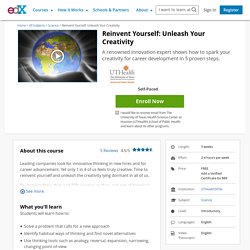
Yet only 1 in 4 of us feels truly creative. Time to reinvent yourself and unleash the creativity lying dormant in all of us. Dr. Roberta Ness, featured TED speaker, author, and one of America’s leading creative thinking innovators, will guide you through her exclusive 5-step program to being an effective innovator. Learn to break free from your usual thinking pattern and start generating creative solutions to life’s challenges.
The funding for this course was made possible by the UTHealth Innovation in Cancer Prevention Research Training Program (Cancer Prevention and Research Institute of Texas grant #RP140103). The Science of Religion. Khanacademy. Khanacademy. Introduction to Game Design. Spirituality and Sensuality: Sacred Objects in Religious Life. This is an Archived Course EdX keeps courses open for enrollment after they end to allow learners to explore content and continue learning.

All features and materials may not be all available. Check back often to see when new course start dates are announced. Playing drums, telling stories, touching stones, creating wildly colorful altars, dancing, eating and drinking special substances are all basic religious activities. Design and Development of Games for Learning. The field of learning games is rapidly growing, with interest from academics, publishers, schools and startups. But what makes a good learning game? Where do ideas come from and how do you create them? These are the questions that this course tries to answer. The premise of learning games from some perspectives seems like a perfect and easy solution - get people to learn things they don’t want to by motivating them through game play. To others it seems like an oxymoron - if learning is hard then it can’t possibly be fun at the same time.
Découvrir l'anthropologie. Comment les humains s’organisent-ils en sociétés ?
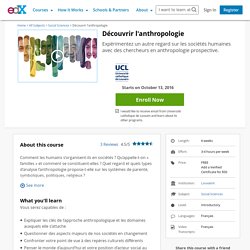
Qu’appelle-t-on « familles » et comment se constituent-elles ? Quel regard et quels types d’analyse l’anthropologie propose-t-elle sur les systèmes de parenté, symboliques, politiques, religieux ? L’anthropologie prospective nous aide à comprendre et à anticiper les phénomènes qui transforment nos modes de vie contemporains. Elle pose un regard transversal sur les actions, les pratiques et les dires des personnes avec lesquelles travaillent les chercheurs. « Entrer en anthropologie », c’est accepter de changer son regard sur le monde et de se décentrer par rapport à ses habitudes. Durant ces quelques heures, vous serez amenés à débattre avec des professeurs et des étudiants autour de questions sur la famille, les migrations, les mondes virtuels ou encore les mondes des invisibles.
Les six semaines de cours aborderont une série de thématiques illustrées par des exemples concrets de modes d’existence divers et disséminés sur le globe. Khanacademy. Khanacademy. U.lab: Leading From the Emerging Future. Course Syllabus Week 0: Introduction to u.lab x1 How to use and navigate the social and community elements of the course.
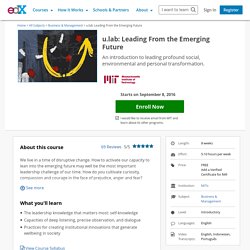
Week 1: Co-Initiating Introduction to the deeper sources of our current global challenges. The art and practice of deep listening. Forming a core team for your U journey. Week 2: Co-Sensing (Pt. 1) Gathering data by suspending and listening. Week 3: Co-Sensing (Pt. 2) Making sense of the data generated through last week’s sensing activities, using embodied practices such as Social Presencing Theater. Week 4: Presencing Retreat and reflect. Week 5: Crystallizing Staying connected to your deeper sources of inspiration. Week 6: Prototyping Learning by doing. Week 7: Co-Evolving Continuation of prototyping activities, plus principles to support the evolution from an idea, to prototype, to an initiative with the potential to scale.
Week 8: Global Movement Building The next steps in the u.lab journey. Introduction to Philosophy: God, Knowledge and Consciousness. This is an Archived Course EdX keeps courses open for enrollment after they end to allow learners to explore content and continue learning.
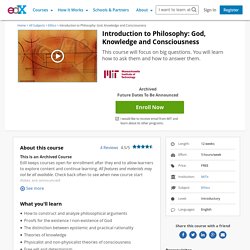
All features and materials may not be all available. Check back often to see when new course start dates are announced. This course has two goals. The first is to introduce you to the things that philosophers think about. The Rise of Superheroes and Their Impact On Pop Culture. New week 6 content has been added in the fourth iteration of this popular course!
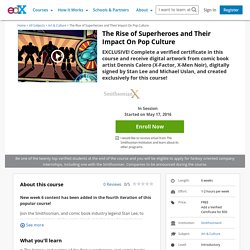
Join the Smithsonian, and comic book industry legend Stan Lee, to explore the history of the comic book and the rise of superheroes. The ancient gods of Egyptian, Greek and Roman myths still exist, but today, they have superpowers, human foibles and secret identities. They come from comic books and graphic novels, and have taken over pop culture on the stage, screen, video games, and animation. From Superman® and Spider-Man®, to The Avengers® and The Hulk® and beyond, who are these heroes? And, how have they evolved from folklore and myth, across all cultures and religions? Stan Lee, who was one of the creators of the modern superhero template.
In this course, we explore the following questions: